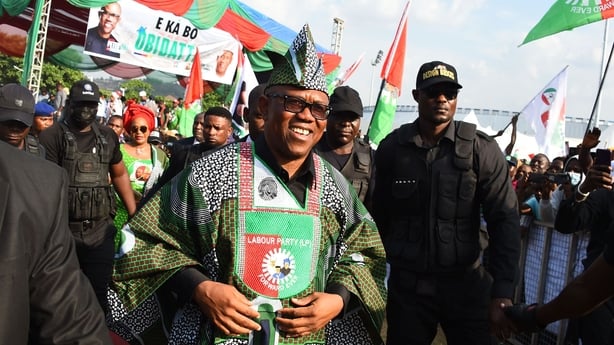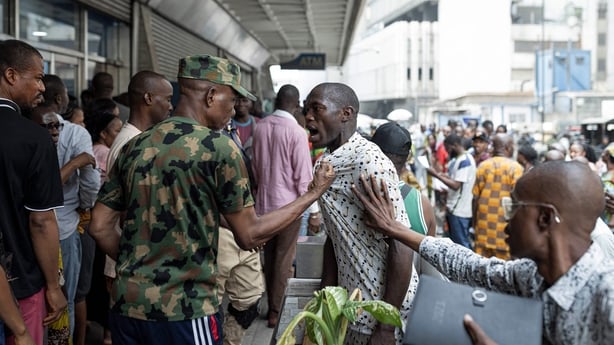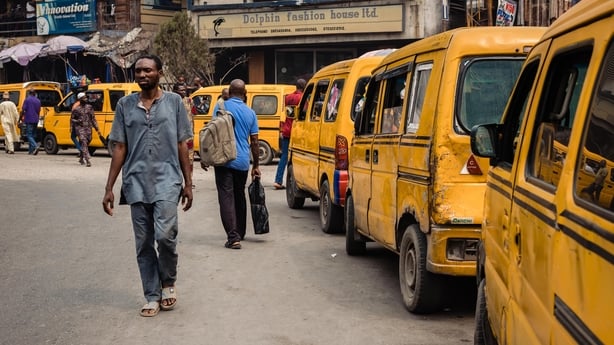For Ebovi Wali, a tech entrepreneur from Lagos, Nigeria, this election feels a little different, and for good reason.
For the first time since 1999, there is no incumbent running for re-election, and none of the candidates are former military leaders. And, this time, there is a credible third-party candidate.
Today, voters in Africa's largest democracy head to the polls in a general election - one that has captivated the entire country.
"What we have right now will affect the decisions for the next 50 years of Nigeria. On the ground, the energy is completely electrifying," Mr Wali told RTÉ News.
"I have never witnessed anything like this."
While there are several political parties in Nigeria, there traditionally have been two leading parties.
The Peoples Democratic Party won every presidential election between 1999 and 2011, and is represented by former vice president Atiku Abubakar.
Bola Tinubu is running for the All Progressives Congress party, which is currently in power. Both are familiar candidates in their 70s.
But analysts believe that Peter Obi, a candidate from the much smaller Labour party, has a good shot of winning the presidency.

Mr Obi, who at 61 seems comparatively youthful, has run on an anti-establishment platform, something that has resonated with the country’s young population.
Though he is a wealthy businessman, he has built a brand by promoting himself as friendly, frugal and scrupulous.
Mr Wali believes that Mr Obi would be more than a figurehead - that he has the empathy needed to place the country on the right path.
"We need a president that feels the pull of Nigerians, that feels the pain of Nigerians, and that’s what Peter Obi represents," he said.
Read more:
Nigerians vote for new president in tight election race
For Rinu Oduala, a human rights activist from Lagos, the zeal of Obi supporters, known as Obidients, is a direct result of a desperate situation in Nigeria.
She told RTÉ News that many Nigerians are frustrated by a lack of jobs, economic instability, entrenched corruption, food insecurity, violent clashes in the north - and regular kidnappings and killings.
She pointed to a recent survey by Afrobarometer, which found that almost 90% of Nigerians thought the country was going in the wrong direction.

"We are one of the world’s top 10 oil producers, but corruption has made our country the world’s poverty capital. Nigerians are looking for someone who will be able to deal with this issue," Ms Oduala said.
"We understand that the situation of Nigeria today requires better. It requires a younger person and a more dynamic person."
Riots have broken out across the country in recent weeks. The unrest is ostensibly about a nationwide cash shortage following the introduction of new banknotes, but discontent has been brewing for years.
Mr Obi’s Obidient movement began in earnest in October 2020, when young Nigerians took to the streets to protest the actions of a police unit known for brutality, extortion and extrajudicial killings.
He took to Twitter and called for better governance in the country.
While some polls place Mr Obi in the lead, the result will depend on turnout, according to Gbemisola Alonge, a senior analyst with Stears, a Lagos-based research firm that tracks election data in Nigeria.
This year, the Nigerian electoral commission recorded 12 million new registered voters. A majority of them are younger voters.
In a high-turnout scenario, Stears believes that Peter Obi will win. But, if fewer people head to the polls, the data suggests that Mr Tinubu will be elected.

Ms Alonge said that the extent to which Nigerians trust the electoral process will be important.
"Do they trust the electoral process? Do they trust the Independent National Electoral Commission to conduct a free and fair election? Do they feel safe coming out to vote?" she asked.
Professor Obindah Gersho, an economist at Covenant University in Nigeria, told RTÉ News that the economy will play a large part in the election.
He agreed that corruption has intensified the poverty crisis.
"You have the young people, professionals who previously were not voting," Prof Gersho said.
"You have a whole multitude of new voters who are pushing for a new Nigeria - a new group of professionals that are looking for something different from the previous political parties."
But it would still count as a major upset if Mr Obi, a candidate from a small party, triumphed.
"I am basing my hope on two things, one is with the polls that have been consistent," said Ms Oduala.
"The second part of my hope is based on young people. We have done it before and can do it again."







